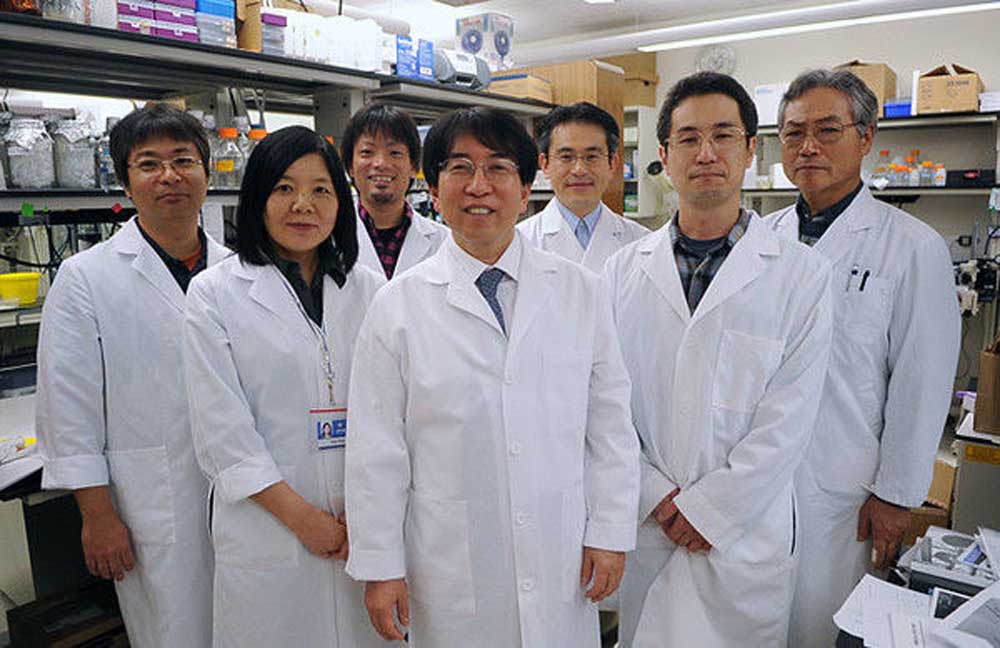Mitsuo Ikebe, Cell Watcher: Internationally renowned scientist seeks clues under the microscope
Published 7:18 pm Saturday, March 29, 2014

- Dr. Mitsuo Ikebe stands in his laboratory at UT Health Northeast with members of his research team. (Victor Texcucano/Staff)
Dr. Mitsuo Ikebe, Ph.D., an internationally respected scientist, is one of the newest additions to the UT Health Northeast Biomedical Research team.
Ikebe, along with a team of nine, studies cell motility, or the ability of a cell and its components to move when stimulated by something outside the cell.
When a protein makes changes to genetic material, usually in a specific location such as the nucleus, it then migrates somewhere else. Understanding this process will help scientists unlock clues to certain diseases.
Ikebe’s research can be applied to many medical problems, including how cancer cells metastasize, how inflammatory cells invade injured tissue and how these tissues repair themselves.
“Knowing the mechanism we can understand why a cell becomes motorized, in terms of migration,” Ikebe said. “If we understand that then we can find a target to stop it.”
Ikebe recently received a $2.25 million STAR (Science and Technology Acquisition and Retention) grant from the UT System for his research.
He’ll use the grant to purchase equipment and parts to make equipment.
“That kind of equipment will enable us to visualize the tracking of the movement at the single molecule level,” Ikebe said.
In addition, he received a $250,000 grant from the STARS Plus program. These funds are intended to cover startup resources that go beyond equipment and renovation needs.
Ikebe said he was attracted to UT Health Northeast because, although small, its research is growing, not shrinking.
“The good thing is because cell motility appears in almost any kind of a subject so it is very easy to find a collaborative effort at this institution,” he said, noting collaboration with a lung injury research group.
He receives praise from his colleagues.
“Dr. Ikebe is a highly accomplished and internationally recognized scientist with a world-class research team,” said Steven Idell, Ph.D., vice president for research at UT Health Northeast. “His work integrates well with our ongoing research programs, especially those in lung injury and repair, lung immunology, and cancer.”
Ikebe is also interested in how smooth muscle cells work. These cells control the constriction of blood vessels — which can lead to atherosclerosis or hardening of the arteries — and the narrowing of the lung’s airways, which occurs in asthma.
Ikebe has spent more than 20 years researching cell motility and received about $9 million in grants from the National Institutes of Health since 2000.
The NIH first funded Ikebe’s research in 1985 and has awarded him, so far, 18 research grants. Ikebe currently has three highly competitive NIH grants. Because of government reductions the grants are increasingly difficult to get.
Ikebe joins UT Health Northeast after 18 years with the University of Massachusetts Medical School in Worcester, Mass.
IKEBE’S LEADERSHIP
Ikebe leads the Department of Cellular and Molecular Biology. He has served as vice chairman of the Department of Physiology at UMMS Medical School and as professor in the UMMS Department of Microbiology and Physiological Systems. He also directs UT Health’s Biotechnology Graduate Program.
He has served on committees that reviewed NIH grant applications in the fields of experimental cardiovascular science and physiological chemistry.
Ikebe, a native of Tokyo, Japan, first became interested in science as an elementary school student. However, his early interest was in astronomy. During high school, he also became interested in genetics and biology.
He has a doctorate in biochemistry and biology from Osaka University in Japan and a master’s degree in biochemistry from the Tokyo Institute of Technology.
CLOSER LOOK—motility defined
In biology, motility is the ability to move spontaneously and actively, consuming energy in the process.






